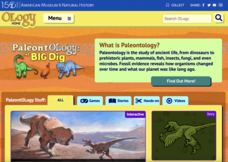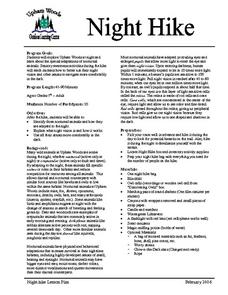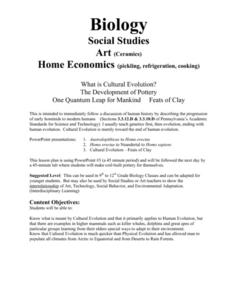American Museum of Natural History
What's This? Colorful Creatures
An online resource shows learners some species that are very good at using their camouflage as well as other ways species use their coloring for survival. Interactive and digital, the lesson is perfect as a remote learning resource.
American Museum of Natural History
Anatomy Adventure
Sometimes science is puzzling. Using an online animation, individuals manipulate skeletal bones of an ancient species to recreate its skeleton. Learners complete the skeletal puzzle and learn about the process of paleontology in person...
Smithsonian Institution
Art to Zoo: Life in the Promised Land: African-American Migrants in Northern Cities, 1916-1940
This is a fantastic resource designed for learners to envision what it was like for the three million African-Americans who migrated to urban industrial centers of the northern United States between 1910 and 1940. After reading a...
Michigan State University
Friend or Foe?
What one person thinks is a pest may not be a pest to someone else. Here, scholars examine the characteristics of living things and pests through grand conversation and a variety of activities. Class members play a game of pest or not a...
Curated OER
Build an Anchialine Pond
Students explore biology by conducting a nature experiment. In this pond examination lesson, students utilize recycled materials, play-doh and water to recreate a pond and its inhabitants. Students identify the different elements within...
Curated OER
Animals of Point Reyes
Seventh graders explore how disasters affect animals. In this animal habitats lesson students create an animal that will survive in Point Reyes habitats.
Curated OER
Night Hike
Learners explore Upham Woods at night and investigate about the special adaptations of nocturnal animals. They identify three nocturnal animals and how they are adapted to the night. Students explain what night vision is and how it works.
Curated OER
Summer: Getting the Bugs Out
Students study biodiversity while examining insects. They research insects that already exist and how they adapt to their environment.
Curated OER
Beneficial Bug Scavenger Hunt
Students identify several beneficial insects and spiders, including predators and pollinators. They search an outdoor environment and record numbers and types of beneficial insects and spiders that they discover.
Curated OER
Discovering Owls
Students are introduced to different types of owls and owl pellets. They list several adaptations that benefit the owls. Students identify the various species of owl that live in Wisconsin. Students discuss owl pellets and identify the...
Curated OER
Activity: Bird Beak Buffet
Students study the functions of bird beaks. In this animal evolution lesson, students compare and contrast different types of bird beaks focusing on how the beaks are adapted to the foods the birds eat. Students record and graph their...
Curated OER
Ecosystems and Climate
Students examine climatic effects on ecosystems. They plant tomatoes and observe the differences in plant growth with differences in light. They create picture collages of plants, animals, and insects found in each climate of the U.S.
Curated OER
The Spider Beside Her
Second graders expand their knowledge of spiders. By creating a model of a spider, 2nd graders recognize differences between spiders and insects and determine that a spider is not an insect.
Curated OER
Science: Birds in Flight
Young scholars identify and examine adaptations in birds that enable them to fly. They conduct Internet research to relate these adaptations to the physics of flight. Students observe birds in flight and describe their behavior and...
Curated OER
Predator-Prey Relationships
Students explore the interrelatedness of predators and prey in four different activities. They simulate an aquatic insect, fish, and osprey food chain during a poker chip game, play an M&M game to simulate the relationship between...
Curated OER
Desert Animals
Students survive within an ecosystem, an animal must be physically and behaviorally adapted to the conditions of its environment.
Curated OER
Jewel of the Earth
Students investigate several organisms, set sticky traps to collect them, and attempt to identify and classify them using a variety of sources. The origins of the organisms are traced and their adaptive features examined.
Curated OER
What is Cultural Evolution?
Students comprehend what is meant by Cultural Evolution and that it primarily applies at Human Evolution, but that there are examples in higher mammals such as a killer whales, dolphins and great apes of particular groups by exploring...
Curated OER
Duck
In this ducks worksheet, students read information paragraphs about the habitat, reproduction, feeding and adaptation of ducks. Students study the photograph of the bird. There are no questions to answer here.
Curated OER
Holy Habitats or Meet Metamorphosis
Young scholars examine the metamorphosis of frogs and how it adapts to its environment. They research how world pollutants are effecting the amphibian population.
Curated OER
Frogs: Fact or Folklore
Learners discover how frogs are adapted to their environment. They view and discuss a Discovery Channel video on frogs and the myths surrounding frogs. In small, groups they compile data on frogs from the internet to create a Frog Fact...
Curated OER
Hedgehog
In this hedgehog worksheet, students read information paragraphs about the habitat, reproduction, feeding and adaptation of hedgehogs. Students study the photograph of the mammal. There are no questions to answer here.
Curated OER
Arthropod Mouth Parts and Food
Students identify the different types of mouths arthropods have for eating various types of food. Given photographs of the different types of arthropods, students identify which mouth they have and what type of food they can eat with...
Curated OER
Ugly? Says Who?
Students explore biology by writing animal poetry in class. In this animal characteristics lesson, students research the Internet for facts about an "ugly" animal such as a bug or small critter. Students complete worksheets about animal...























